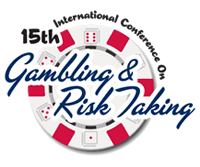Submission Title
Presentation Type
Event
Location
Caesars Palace, Las Vegas Roman Ballroom
Start Date
29-5-2013 10:00 AM
End Date
29-5-2013 10:30 AM
Disciplines
Education | Gaming and Casino Operations Management | Mental and Social Health | Psychology | Public Affairs, Public Policy and Public Administration | Sociology | Substance Abuse and Addiction
Abstract
The theory of planned behaviour (TPB) and the concept of anticipatory negative emotions have attracted considerable research attention in the formulation of effective preventive interventions. This approach has identified several key constructs (i.e., attitudes, subjective norms, perceptions of control, anticipation of negative emotions) as valid predictors of gambling intentions and behaviour. However, no empirical investigation has utilized these constructs in the design or evaluation of a youth problem gambling prevention initiative.
Objectives. The current research aims to assess the effects of a prevention video on gambling-related attitudes, subjective norms, control perceptions, anticipated negative emotions, and intentions. The video focuses on a problem gambler’s testimonial and includes dramatic vignettes depicting the potential risks and consequences associated with excessive gambling.
Methodology. A sample of 328 high school students were randomly assigned to either a video or control group. Participants were assessed at pre- and post-intervention.
Results. Preliminary results reveal that the video produced changes in students’: (i) attitudes towards; (ii) perceptions of control over and; (iii) negative anticipatory emotions following excessive participation in gambling. Individuals receiving the intervention were observed to have a significant decreases in positive attitudes toward gambling as well as perceptions of control over gambling, and a significant increase in their anticipation of negative emotions for becoming over-involved in gambling.
Conclusions. Positive effects of the video were found. Recommendations for future research are discussed.
Included in
Education Commons, Gaming and Casino Operations Management Commons, Psychology Commons, Public Affairs, Public Policy and Public Administration Commons, Sociology Commons, Substance Abuse and Addiction Commons
Mid-morning Break and Poster Sessions: Application of the Theory of Planned Behaviour within School-Based Prevention Programs for Adolescent Gambling
Caesars Palace, Las Vegas Roman Ballroom
The theory of planned behaviour (TPB) and the concept of anticipatory negative emotions have attracted considerable research attention in the formulation of effective preventive interventions. This approach has identified several key constructs (i.e., attitudes, subjective norms, perceptions of control, anticipation of negative emotions) as valid predictors of gambling intentions and behaviour. However, no empirical investigation has utilized these constructs in the design or evaluation of a youth problem gambling prevention initiative.
Objectives. The current research aims to assess the effects of a prevention video on gambling-related attitudes, subjective norms, control perceptions, anticipated negative emotions, and intentions. The video focuses on a problem gambler’s testimonial and includes dramatic vignettes depicting the potential risks and consequences associated with excessive gambling.
Methodology. A sample of 328 high school students were randomly assigned to either a video or control group. Participants were assessed at pre- and post-intervention.
Results. Preliminary results reveal that the video produced changes in students’: (i) attitudes towards; (ii) perceptions of control over and; (iii) negative anticipatory emotions following excessive participation in gambling. Individuals receiving the intervention were observed to have a significant decreases in positive attitudes toward gambling as well as perceptions of control over gambling, and a significant increase in their anticipation of negative emotions for becoming over-involved in gambling.
Conclusions. Positive effects of the video were found. Recommendations for future research are discussed.

Comments
File: Poster